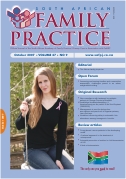Variables influencing delay in antenatal clinic attendance among teenagers in Lesotho
Keywords:
teenage pregnancies, late antenatal attendance, factors influencing antenatal attendance
Abstract
Background A delay in deciding to seek antenatal care is predominant among pregnant teenagers in Lesotho. This subsequently leads to delay in reaching treatment and in receiving adequate treatment. Early antenatal care attendance plays a major role in detecting and treating complications of pregnancy and forms a good basis for appropriate management during delivery and after childbirth. Although antenatal care is provided at different levels, Lesotho still has a high maternal mortality rate, estimated at 762 per 100 000 live births, and an infant mortality rate of 72 per 1 000 live births.1 Lesotho has a chronic shortage of doctors and nurses. According to the Lesotho Population Data Sheet of 2000, the doctor-patient ratio for this country for the year 1999 was 1:13 041 and the nurse ratio was 1:2 035. About 31% of the adult population between the ages of 15 to 49 years is infected with HIV/Aids.1 This shortage of health care personnel and the impact of HIV/Aids result in insufficient focus on health promotion in reproductive health, especially birth preparedness, and lack of community participation and male involvement in reproductive health care issues. Early sexual activities with consequent early pregnancy lead to high maternal and neonatal morbidity and mortality. As a result, the National Adolescent and Development Programme was started in 1998 by the Ministry of Health and Social Welfare to address the needs of teenagers. This led to the establishment of adolescent health clinics (referred to as teenage corners) that focus on teenagers in three districts of Lesotho, namely Mafeteng, Maseru and Leribe. Despite the establishment of these teenage corners, delay in antenatal attendance is still prevalent in Lesotho. Out of 632 pregnant teenagers in 2003 who attended the clinic at Queen II Teenage Corner, the majority (43%) visited the antenatal clinic for the first time during the third trimester and only 14.9% attended in the first trimester. This late antenatal clinic attendance provides little or no time for appropriate screening, management of risk factors, if detected, and timely referral. The aim of this study was to identify variables that contribute to delay in antenatal clinic attendance among pregnant teenagers and to make recommendations based on the research findings for the development of policies that will ensure early attendance. Method An exploratory, descriptive research design was used to acquire understanding of the variables that contribute to the delay in antenatal clinic attendance among teenagers in Lesotho. The population composed of all pregnant teenagers who have started their antenatal clinic attendance at the three teenage corners after the thirteenth week of gestation. Purposive sampling was used and the sample was considered adequate when saturation of data was reached. A total of 21 pregnant teenagers and 21 parents/guardians participated. Data was gathered through observation of records and activities undertaken at the teenage corners and through in-depth interviews with the teenagers and their parents/guardians. A semi-structured interview schedule was used. Results and conclusions Twenty-one pregnant adolescents were interviewed, of which 71.3% started antenatal clinic attendance during the second trimester, while 28 (57%) started during the third trimester. Variables that contributed to the delay in early antenatal attendance included lack of knowledge regarding the importance of early attendance, denial of the pregnancy by the boyfriend, the fact that sex outside of marriage in Lesotho is still taboo and structural variables related to service provision. The interviews with the pregnant teenagers and their parents/guardians highlighted the need to empower teenagers through education and counselling and the need for the Minister of Education and Training to review policy regarding the expulsion of pregnant teenagers from school. Community awareness campaigns should be held annually to sensitise the public about the increasing rates of teenage pregnancies in Lesotho and the consequences thereof. Life skills education and teenage pregnancy issues should be included in the health courses for primary school learners as early as grade 6 and 7.
Published
2007-10-18
Section
Original Research
By submitting manuscripts to SAFP, authors of original articles are assigning copyright to the South African Academy of Family Physicians. Copyright of review articles are assigned to the Publisher, Medpharm Publications (Pty) Ltd, unless otherwise specified. Authors may use their own work after publication without written permission, provided they acknowledge the original source. Individuals and academic institutions may freely copy and distribute articles published in SAFP for educational and research purposes without obtaining permission.

